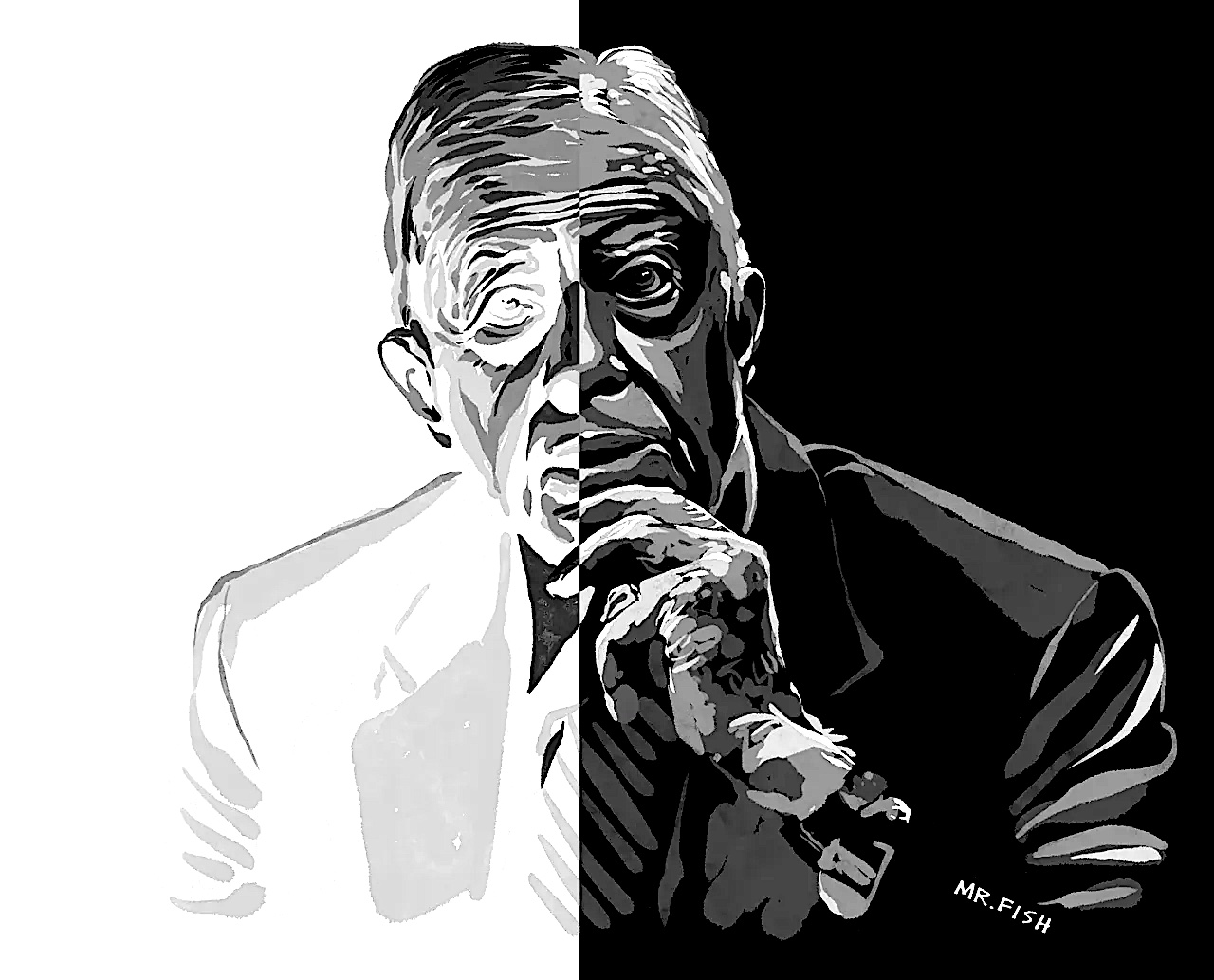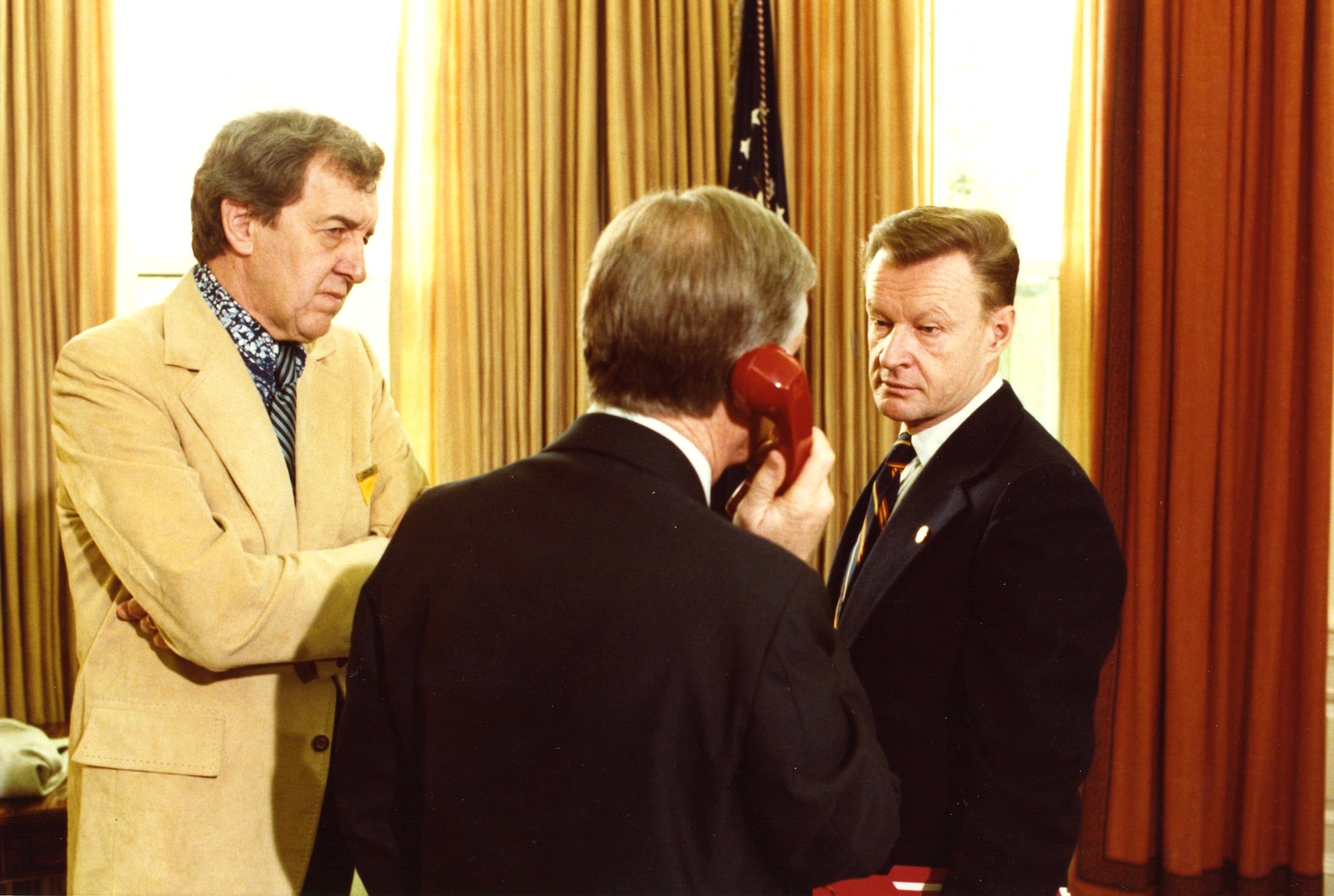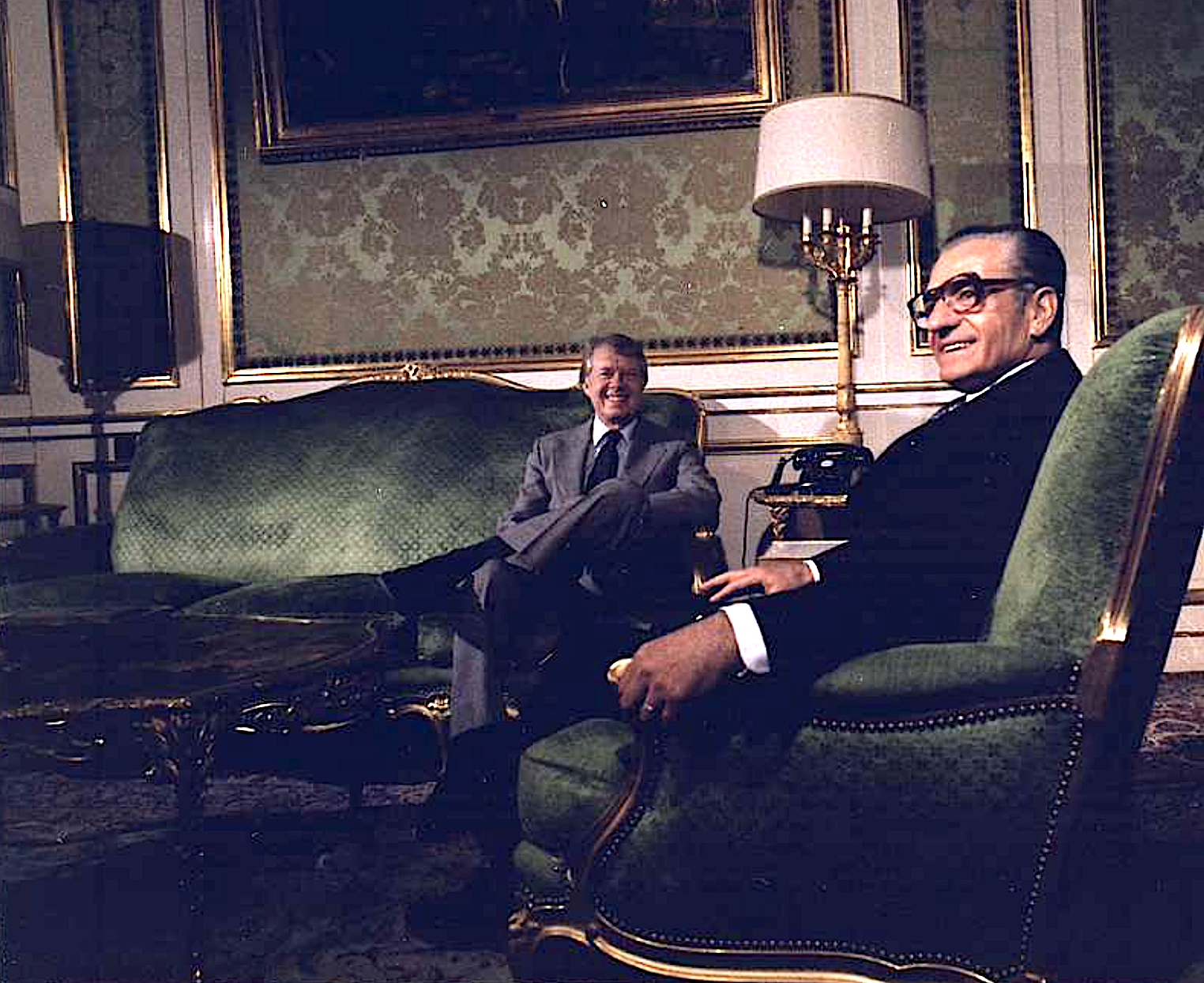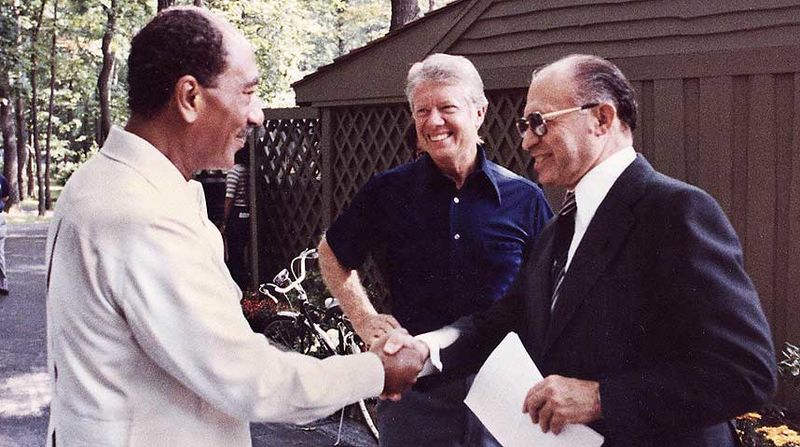The late U.S. president may have done good works out of office, but in power he fomented a series of domestic and foreign policy disasters.

This, That or the Other Carter – by Mr. Fish.
 Jimmy Carter, out of office, had the courage to call out the “abominable oppression and persecution” and “strict segregation” of Palestinians in the West Bank and Gaza in his 2006 book Palestine: Peace Not Apartheid.
Jimmy Carter, out of office, had the courage to call out the “abominable oppression and persecution” and “strict segregation” of Palestinians in the West Bank and Gaza in his 2006 book Palestine: Peace Not Apartheid.
He dedicated himself to monitoring elections, including his controversial defense of the 2006 election of Hugo Chavez in Venezuela, and championed human rights around the globe.
He lambasted the American political process as an “oligarchy” in which “unlimited political bribery” created “a complete subversion of our political system as a payoff to major contributors.”
But Carter’s years as an ex-president should not mask his dogged service to the empire, penchant for fomenting disastrous proxy wars, betrayal of the Palestinians, embrace of punishing neoliberal policies and his subservience to big business when he was in office.
Carter played a significant role in dismantling New Deal legislation with the deregulation of major industries including airlines, banking, trucking, telecommunications, natural gas and railways.
He appointed Paul Volcker to the Federal Reserve, who, in an effort to combat inflation, drove up interest rates and pushed the U.S. into the deepest recession since the Great Depression, a move that saw the start of punishing austerity cuts.
Carter is the godfather of the pillage known as neoliberalism, a pillage fellow Democrat Bill Clinton would turbo charge.
Carter fell under the disastrous influence of his Svengali-like national security adviser, Zbigniew Brzezinski, a Polish exile, who rejected the Nixon-Kissinger reliance on détente with the Soviet Union.
Brzezinski’s life’s mission, one that meant he saw the world in black and white, was to confront and destroy the Soviet Union along with any government or movement he deemed to be under communist influence or sympathetic to it.

Brzezinski, on right, and Edmund Muskie, left, with Jimmy Carter as the president spoke to Moscow with the red phone, 1980. (Center for Strategic & International Studies, Flickr, Public domain)
Carter, under Brzezinski’s influence, walked away from the Strategic Arms Limitation Talks treaty (SALT II) with the Soviet Union, which sought to curb nuclear weapons deployment. He increased military spending.
He sent military aid to the Indonesian New Order government during the Indonesian invasion and occupation of East Timor, which many have characterized as a genocide.
He supported, along with the apartheid state of South Africa, the murderous counter revolutionary group, the National Union for the Total Independence of Angola (UNITA), led by Jonas Savimbi.
He provided aid to the brutal Zairian dictator Mobutu Sese Seko.
He supported the Khmer Rouge.
He instructed the Central Intelligence Agency to back opposition groups and political parties to bring down the Sandinista government in Nicaragua once it took power in 1979, leading under the Reagan administration to the formation of the Contras and a bloody and senseless U.S.-backed insurgency.
He provided military aid to the dictatorship in El Salvador, ignoring an appeal from Archbishop Oscar Romero — later assassinated — to cease U.S. arms shipments.

Carter and Mohammad Reza Pahlavi, the shah of Iran, undated. (National Archives and Records Administration, Public domain)
He poisoned U.S. relations with Iran by backing the repressive regime of Shah Mohammad Reza Pahlavi until the last minute and then allowing the deposed shah to seek medical treatment in New York, triggering the occupation of the U.S. embassy in Tehran and a 444-day hostage crisis.
Carter’s belligerence — he froze Iranian assets, stopped importing oil from Iran and expelled 183 Iranian diplomats from the U.S. — played into Ayatollah Khomeini’s demonization of the U.S. and calls for Islamic rule. He obliterated the credibility of Iran’s secular opposition.
Please Support CN’s
Winter Fund Drive!
Carter gave Philippine President Ferdinand Marcos, although he ruled under martial law, billions in military aid. He armed the Mujahideen in Afghanistan after the Soviet intervention in 1979, a decision that cost the U.S. $3 billion, saw the deaths of 1.5 million Afghans and led to the creation of the Taliban and Al Qaeda.
[In a 1999 interview with Le Nouvel Observateur, Brzezinski admitted the U.S. armed the Mujahideen in order to provoke the Soviets to invade Afghanistan.” He said: “I wrote a note to the president in which I explained to him that in my opinion this aid was going to induce a Soviet military intervention … That secret operation was an excellent idea. It had the effect of drawing the Russians into the Afghan trap and you want me to regret it? The day that the Soviets officially crossed the border, I wrote to President Carter, essentially: ‘We now have the opportunity of giving to the USSR its Vietnam war.’]
The blowback from this Carter policy alone is catastrophic.
He backed the South Korean military in 1980 when it laid siege to the city of Gwangju, where protestors had formed a militia, which led to the massacre of some 2,000 people.

Egyptian President Anwar Sadat, U.S. President Jimmy Carter and Israeli Prime Minister Menachem Begin at Camp David in September 1978. (Wikimedia Commons)
Finally, he sold out the Palestinians when he negotiated a separate peace deal, known as the Camp David Accords, in 1979 between Egyptian President Anwar Sadat and Israeli Prime Minister Menachem Begin.
The agreement excluded the Palestine Liberation Organization from the talks. Israel never, as promised to Carter, attempted to resolve the Palestine question with Jordan and Egypt’s involvement.
It never permitted Palestinian self-government in the West Bank and Gaza within five years. It did not end Israeli settlements — a refusal that led Carter to later claim Begin had lied to him.
But since there was no mechanism in the agreement for enforcement, and since Carter was unwilling to defy the Israel lobby to impose sanctions on Israel, the Palestinians found themselves, once again, powerless and abandoned.
Carter, to his credit, did appoint the civil rights activist Patricia Derian as his assistant secretary of state for human rights and humanitarian affairs, leading to the blocking of loans and reduction in military aid to the military junta in Argentina during the Dirty War, restrictions the Reagan administration removed.
Derian’s commitment to human rights was genuine. She supported Philippines leader Benigno S. Aquino Jr. and the South Korean dissident and former president Kim Dae-jung.
Carter allowed her to anger a few of our most repressive allies. But his human rights policy was primarily designed to back democratic dissidents and worker movements in Central and Eastern Europe, especially Poland, in an effort to weaken the Soviet Union.
Carter had a decency most politicians lack, but his moral crusades, which came once he was out of power, seem like a form of penance. His record as president is bloody and dismal, although not as bloody and dismal as the presidents who followed. That’s the best we can say of him.
Chris Hedges is a Pulitzer Prize–winning journalist who was a foreign correspondent for 15 years for The New York Times, where he served as the Middle East bureau chief and Balkan bureau chief for the paper. He previously worked overseas for The Dallas Morning News, The Christian Science Monitor and NPR. He is the host of show “The Chris Hedges Report.”
This article is from The Chris Hedges Report
NOTE TO READERS: There is now no way left for me to continue to write a weekly column for ScheerPost and produce my weekly television show without your help. The walls are closing in, with startling rapidity, on independent journalism, with the elites, including the Democratic Party elites, clamoring for more and more censorship. Please, if you can, sign up at chrishedges.substack.com so I can continue to post my Monday column on ScheerPost and produce my weekly television show, “The Chris Hedges Report.”
This article is from Scheerpost, for which Chris Hedges writes a regular column. Click here to sign up for email alerts.
Views expressed in this article may or may not reflect those of Consortium News.
Please Support CN’s
Winter Fund Drive!![]()
Make a tax-deductible donation securely by credit card or check by clicking the red button:


He did sign H.R. 1337, which legalized small scale production of beer and wine at home (100 gallons a year per adult/200 gallons max). Not an insignificant freedom, and definitely worth mentioning. So, when the proverbial crap hits the fan, you can wash your iodine pills down with some fine homemade hooch.
Pitiful response. Such “freedom” is NEARLY insignificant.
“Carter had a decency most politicians lack, but his moral crusades, which came once he was out of power, seem like a form of penance.“
I think this line is why people are holding Carter in a better light than the other presidents. It feels like he at least tried to make amends for the crimes of empire he committed while in power.
One lesson is to be careful of an advisor that hold ages of Polish versus Russian religious and other long tern grudges that predate communism and continue to be weaponized in the Ukraine to profit off of more suffering using our Western military offensive permanent war complex.
We aided terrorists from all over the Middle East as hired mercenaries to provoke the USSR to come to the aid of their neighbor and the risks presented of those same forces in the USSR and just in time for a 1980 Moscow Olympic boycott like the just in time failed boycott of the Sochi Olympics over the Ukraine.
Carter didn’t admit secret negotiation were being made for the Embassy hostages release but Bill Casey, the engineer of Reagan’s 1980 New Hampshire primary win and Republican nomination, scuttled the deal offering better term after election and his appointment as CIA director. He may have had religious interests against the USSR and support for terrorists in Afghanistan and Central America too, being in the Order of Malta using drug lords as freedom fighters in exchange for drug sales.
One lesson is to be careful of an advisor that hold ages of Polish versus Russian religious and other long tern grudges that predate communism and continue to be weaponized in the Ukraine to profit off of more suffering using our Western military offensive permanent war complex.
We aided terrorists from all over the Middle East as hired mercenaries to provoke the USSR to come to the aid of their neighbor and the risks presented of those same forces in the USSR and just in time for a 1980 Moscow Olympic boycott like the just in time failed boycott of the Sochi Olympics over the Ukraine.
Carter didn’t admit secret negotiation were being made for the Embassy hostages release but Bill Casey, the engineer of Reagan’s 1980 New Hampshire primary win and Republican nomination, scuttled the deal offering better term after election and his appointment as CIA director. He may have had religious interests against the USSR and support for terrorists in Afghanistan and Central America too, being in the Order of Malta using drug lords as freedom fighters in exchange for drug sales.
All correct
But a waste of breath trying to tell America, and much of the world sadly.
Who are all invested in believing in Presidents, as if they make any significant difference.
They’re all just hubristic, greedy, self-serving slags.
The political systems are psychopathic and just plonk in whoever suits their purposes at the time.
But thanks Chris for your moral courage and great writing.
The point I take from this analysis is that the forces driving the movements of today’s world exceed the capacity of any individual in central positions of power to ‘do good’ as a primary result of their actions; the motivations and immediacy of power irretrievably distort Reality. The danger that this represents to humanity (and the living surface of the earth) as a whole can’t be overestimated. Yes, we should, if there were a way, have the best of humans in positions of power (philosopher kings?), but, to date, there has never been a way to avoid Lord Acton’s dictum…Carter is fine example: a measured degree of corruption is required to come to and maintain power, and can be overcome by some. What we must realize is that the human domination of the earth (in the blink of the geological eye) has no organic design formulating a desirable outcome; political analysis needs to begin there!
The Brzezinski / Carter intervention did not follow after the Soviet invasion as stated here. As Brzezinski claimed in his 1998 review, “I wrote a note to the president in which I explained to him that in my opinion this aid was going to induce a Soviet military intervention.” This was in reference to aid to the Mujahideen in July 1979, five months before the Soviet intervention. He then boasted of having given the Soviet union its own Vietnam.
Carter wrote a great book documenting Israeli lawlessness and sadism against the innocent Palestinians. Good.
However, Carter bought into the stupid Russiagate narrative and pontificated about it several times when it was gaining steam around 2015 and hasn’t let up much since. He can’t be forgiven for lending his imprimatur to the anti-Putin anti Russia dumb nonsense.
Poor pathetic Jimmy Carter. He always wanted to be in with the In Crowd even though they shunned him until he died….
Americans need to realize the same people who have exported their abuse and cruelty to the far corners of the world are more than capable, and yes willing to inflict the same bloody and dismal behavior on their own citizens to enforce their global hegemony and financial control.
Jimmy Carter’s record as president was, sadly, gruesome.
On coming to power, he did something that was extremely reckless: He abandoned the SALT II negotiations that he inherited from President Ford and made a new set of proposals. This was absolutely the wrong thing to do. As a result, the treaty was not signed until 1979 when it probably could have been signed in 1977. The difficult question of how to achieve deep reductions in nuclear weapons should have been the subject of a follow-up agreement.
Carter cancelled the B1 strategic bomber when it would have been better to cancel the highly dangerous, because of its accuracy and short flight time, Pershing II missile and slow down the MX ICBM.
His administration decided to develop the neutron bomb which was designed to produce less blast and more radiation. This was supposedly to counter a huge advantage in conventional weaponry for the Soviet Union and the then Warsaw Pact in central Europe. But such an advantage did not really exist anyway. Popular protests, particularly in West Germany, caused Carter to shelve the project.
What really surprised me was that his obituary in the Guardian mentioned the fact that the Carter administration armed the rebels in Afghanistan BEFORE the Soviet invasion of that country.
On 25 July 1980, President Carter signed Presidential Decision Directive 59 (PD59) that was designed to give presidents more flexibility in using nuclear weapons! Its title was “Nuclear Weapons Employment Policy.
After leaving office, Jimmy Carter did many good things. He spoke out against the death penalty. However, I found out whilst researching this comment, that he had been instrumental in bringing it back in the first place.
“In 1973, while serving as governor of Georgia, Carter played an instrumental role in convincing the U.S. Supreme Court to lift the moratorium on the death penalty it imposed a year earlier. He did this by signing into law guidelines for applying the death penalty that met the court’s criteria for constitutional executions in the case Gregg v. Georgia in 1976. And with that case, the national moratorium on executions was lifted.”
(Death Penalty Focus website).
In 1972, Carter wrote to Lyndon Johnson:
“I have long admired you personally and deeply appreciate your tremendous and unprecedented achievements as president.”
And so, it is perhaps not altogether surprising that he should join the outcry in 2003 against The History Channel for its final episode of The Men Who Killed Kennedy for its claim that Lyndon Johnson was behind the assassination of President Kennedy.
Yes, I view Carter’s death with considerable sadness but we should not forget his actual record in office.
Let us be correct about history here friends.
Trivia -Boats: The term used by Navy sub commanders to describe their underwater craft.
These Navy Officers are of a different breed – if nuclear war goes down, they will be some of the very last to witness the carnage.
So it was to be with Carter, he was headed in that direction until his father died. When carter worked at the NRX reactor which had a partial meltdown Dec. 12, 1952 he re-evaluated his thoughts on all things nuclear.
The neutron bomb is / was basically an altered Hydrogen bomb – the hydrogen bomb originally called the “the Super” because of the increased energy the device creates creates ( rather cheaply) a prodigious series of successive deadly neutron generations.
Carter deferred on it and Ronnie Raygun brought it back. In doing so he almost ended up being responsible for a massive USAEC disaster. NATO hated the idea for very obvious reasons. But I regress.
Before you lose it I strongly suggest you get on line and go to; hXXps://www.spaceforce.com/article/the-neutron-bomb.
For everyone’s edification what got Jimmy in such a jam in D.C. was his refusal to give the go ahead to reprocessing of spent nuclear fuel, which meant no continuation of plutonium production. The military and nuclear industry went berserk.
Carter had committed political suicide.
In the end the blow back from these tightly held secret events led to the re-organization of the USAEC, this along with a series of events directly connected to the acquisition of Special Nuclear Materials by Israel.
Reprocessing was the USAEC’s (United States Atomic Energy Commission) ‘pie in the sky’ solution to getting rid of spent nuclear reactor fuel. A process which creates ever more quantities of hazardous mixed waste to be disposed of. This is the true nature of the nuclear power / nuclear weapons business.
Trivia: What does the U.S. government classify as high level radioactive waste? Spent nuclear fuel and the material added to it to reprocess it. Look it up kiddies!
It’s only your money folks. Everyone is talking but nothing is being done.
Thanks CN
The last line of this article sums it up succinctly. Although I believe that Carter was one of the most unfairly maligned modern day presidents by the mainstream media as well as by his own party, never mind Republicans, he certainly doesn’t deserve being deified. And those presidents that followed him WERE worse, but few faced the criticism he did.
The “crimes” violence, under Carter can be, for the most part, laid on the desk of Brzezinski ! What a sick human being obsessed with great game against the Soviet Union. Without the machinations of Brzezinski , the Cold War, embraced by Ray Gun, might have been of a different character. Carter’s many disasters can be attributed, in the main, to the fact that he listened to Brzezinski .
Agreed. I wonder who recommended Brzezinski to Carter anyway? Carter was a newbie to DC and as I recall he had a bit of a ‘peace mandate’ because most of the country was sick of the wars in SE Asia, so why did he go with such a rabid anti-Russian zealot?
David Rockefeller. He Carter and Brzezinski were connected in the Trilateral Commission.
hxxps://www.thecrimson.com/article/1976/1/12/carters-trilateral-connection-pmondale-vance-brzezinski/
Oh, cronies in the TriLateral Commission — that explains it, and drops my estimation of Carter another notch. Thanks.
I am not an expert on American history. One thing I will say is that at the time Carter was President, the Congress was still required to authorize wars. Today, since 9/11/01, the President has virtually unlimited powers to declare war. My point being that Carter did not unilaterally do all of the things that are listed here, as pretty much George W, Obama, and Biden have done as Presidents. While these terrible things happened when Carter was President (i.e. East Timor) he was not solely responsible due the U.S. Constitutional checks and limitations that existed then. Today, those checks and balances seem nonexistant and Presidents do whatever they want, (Biden and Palestine genocide, Obama and destruction of Libya and murder of Ghadaffi). I think you are being unfair to Judge Carter by today’s standards of Presidential powers (dictatorships) when those did not exist during Carter’s Presidency. I appreciate you work and your scholarship, Mr. Hedges. I think this article is overly negative on the legacy of President Carter, though.
Timely and important article! One correction (as already pointed out here by A), Carter’s support of the Mujahideen happened before the Soviet incursion into Afghanistan, not after it. Carter authorised the CIA Operation Cyclone to fund and arm the tribal Mujahideen in July 1979. The Soviet Union went into Afghanistan in December 1979, precisely because they knew what the US was up to. This is an important point. It shows the Soviets had a valid reason for intervening, which is never mentioned in Western analysis. And more importantly, it shows the US presence in Afghanistan at this time was even more outrageous and more heinous than most imagined. Afghanistan ended up losing its only progressive and secular government, with its president barbarically hanged from a street light. And the whole planet was made infinitely more dangerous with an armed Mujahideen eventually giving the world Al Qaeda and the Taliban.
Excellent analysis. Yet another reminder that the truth is often very unpleasant.
Yes. This article should be widely disseminated.
Many view Carter as inept. Far from it … as this article chronicles.
Jimmy Carter until now stood out to me for his attempt to bring the US to the metric system and how (part of) the Republican side used that against him on the grounds that he was undermining “American Exceptionalism”. That’s all I knew about him.
Thanks for that point. I wonder what our trade and other loses are as a result of our being out of the metric system. An opportunity lost. As ever, we choose short term politics over long term benefits.
One of Carter’s many crimes: initiating the destruction of Afghani civil society by initiating support for mujahideen via Pakistani intelligence.
They morphed into the Taliban and Al Qaeda, which later (with additional “help” from the US and the West, into ISIS).
No, he did not do it after Soviet intervention. He did it BEFORE Soviet intervention, which is one of the instigations of Soviet intervention.
This is correct! Thank you.
Thank you Chris, for your honesty with important details, which I recall but not clearly like you. Carter’s disastrous Cold War policy via Brzezinski has led to the horrible war now between Ukraine and Russia. I knew peace activists in Central America who suffered (and some died) due to Carter’s policies in Nicaragua and El Salvador. Yes, his penance vis a vis Habitat for Humanity….his conscience catching up with him,,,,,Oh how I wish the NYTimes, LA Times or Washington Post would publish you. But they are hand and glove
with the military industrial complex. A bow of thanks to you Chris Hedges from an elder poet out west. Blessings across the miles/
This is hitting below the belt, Hedges!!! Mention one US president – just one, that was ‘perfect’ while in office…Just one! And then mention a US president – just one, that engaged in so many humanitarian efforts after leaving office. Just one, Hedges! You disappoint.
His last line is “His record as president is bloody and dismal, although not as bloody and dismal as the presidents who followed. That’s the best we can say of him.”
Clearly he’s saying none were perfect and those that followed were worse.